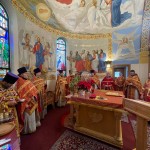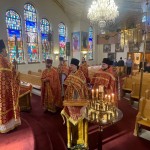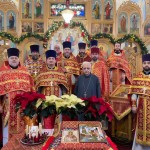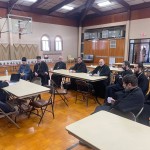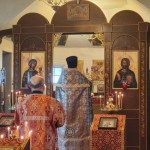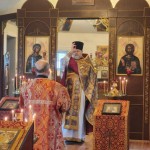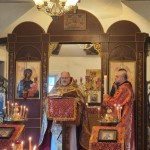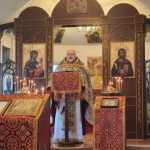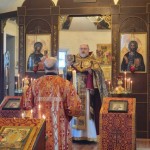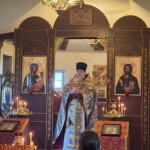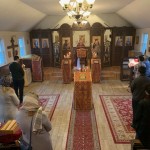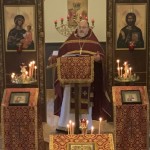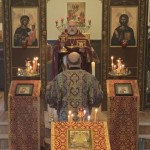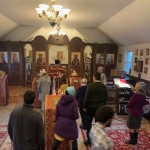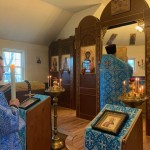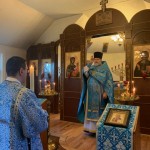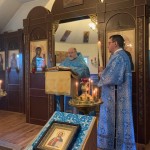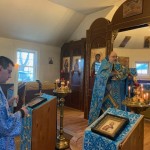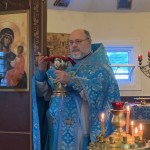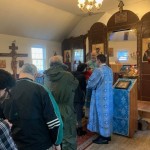On December 11, on the 26th Sunday after Pentecost, our Parish family gathered for a nice celebration. Our Rector, Archpriest Igor Tarasov performed the Divine Liturgy in our St. George Church. After the reading from the Holy Gospel he preached the following homily:
“Dear brothers and sisters in Christ! Today the Holy Gospel tells about the healing of a woman who was sick, bent over for 18 years (Lk. 13, 10-17). She came to the synagogue on the Sabbath, and our Lord Jesus Christ who was there teaching the people delivered her from her infirmity. You may think that all the people present there should rejoice seeing that healing. However, as the Gospel says, some of them condemned Christ for that act because it was done on the Sabbath when, according to the Jews, no labor can be performed”.
“Therefore, dear brothers and sisters, today we should speak about proper keeping of the Fourth Commandment of God, “Remember the Sabbath day to keep it holy” (Ex. 20, 8). That Commandment was very important for the Jews in the times of Christ and it is still very important among them. “Sabbath”, or in Hebrew shabat means rest, discontinuance of any work. That Commandment was set by God, so after 6 days of work man may rest on the 7th day; that he may stop working physically but may engage in some spiritual work – to remember about God and to pray. In a similar way, according to the Book of Genesis, God Himself was creating the world in 6 days and rested on the 7th day and blessed that 7th day (Gen. 2, 1-3). And when God was giving His law to Moses, it contained that Commandment to remember that 7th day of Sabbath and to keep it holy”.
“However, that Commandment was not always understood correctly. The Jewish religious sect of Pharisees in the times of Christ was teaching to keep the Sabbath very strictly, but mostly outwardly. And their cause was continued by the Jews after Christ. If the Sabbath starts, they stop everything. Nothing can be done. They may not even walk longer than it is prescribed. They may not light the fire. Nowadays they say that you may not drive a car or ride in the elevator. A bunch of Jewish books were written about that – they call them the Talmud. And it contains so many prescriptions: what can be done and what cannot be done on the Sabbath, so the common man can easily get confused. This is why, when Jesus came to the world, He began to denounce the Pharisees telling them that they replaced the Commandments of God by the teaching of men”.
“Thus Jesus in today’s Gospel was condemned by those Talmudists because He performed a healing on the Sabbath. But the Lord properly responded to the accusers. He called them hypocrites and reminded that even on the Sabbath they perform necessary works, like, for instance, they loose their ox or donkey from the stall, and lead it away to water it (Lk. 10, 15)”.
“For the Jews, Sabbath was the day of the Lord, and for us such day is Sunday. In the New Testament it replaced the Sabbath because on that day, the first after the Sabbath, our Lord was risen from the dead. Therefore, in the Russian language that day is called voskresenie, the Resurrection. And every such 7th day is a little Pascha, commemoration of the Christ Resurrection. And if you take the Slavonic word for Sunday – nedelia – it is from the words “ne delati” meaning “not doing”. It means that on this day we don’t work. So, for us the Fourth Commandment had never been abolished. In our Christian observance, first of all, we need to keep the spirit of the Lord’s day: for 6 days we have to do our work, and then the 7th day should be dedicated to God. It means that on Sunday we have to abstain from physical and any unnecessary work, and to come to the church for prayer and participation in the Divine Liturgy. We should also perform the works of mercy and charity on that day. However, many people violate that Commandment, especially nowadays”.
“We may recall that in our old country many people were not raised in faith, so most of them now do not observe the Lord’s day. The Communists who were in power in those lands, were fighting the religion and wanted to alienate the people from keeping the Lord’s day. They were holding special working days on Sunday, requested schoolchildren to collect scrap metal. The farmers during the reap season were forced to work relentlessly in the fields. As the result, many Soviet people, even those who were not complete atheists, began not to observe Sundays: they did cleaning of their homes, washing of their clothes or cultivating their gardens. Only a minority, and mostly the inhabitants of the regions occupied by the Soviets later – like people in the Western Ukraine – kept many Christian customs and observed that Commandment”.
“But nowadays even the people living in the Western world which was not under the godless Communist rule, people in Europe and America, lose Christian faith and neglect the Commandments. And therefore, now we see everywhere that the Fourth Commandment is not observed: the people mow their loans, wash their cars or do other physical work on Sundays. There used to be so-called the “blue laws” in America that prohibited to open the stores on Sundays, but now most of them are repealed”.
“Dear brothers and sisters, all these things are sad. But, despite the spirit of this world, we have to keep the true faith and strive to observe the Commandments of God. But in our observance we need to beware of the “leaven of the Pharisees”, meaning that we need to observe Sunday not only outwardly. For among us we may have some legalistic persons resembling the Pharisees. They would not work, would not even use the scissors on Sunday, but would judge the neighbor or would not help him. We need temperance in everything, not an unwise zeal. Therefore, as the Lord taught us, we need to observe the spirit, not the letter of the law. “The Sabbath was made for man, and not man for the Sabbath”, – He taught (Mk. 2, 27). Therefore, any good deed done for another person should always be performed, especially on the holy days. To visit the sick, to feed the hungry, to serve others, as the Gospel teaches – all that should be done. On the other hand, we should not hide behind the “help of your neighbor”, but do cleaning or washing on Sundays if that’s convenient for us. We need to have reasoning and desire to please the Lord”.
“That sick woman who was bent over and could not straighten up is the image of our soul. Sometimes sin bends our soul, so in our life we see nothing but dirt, nothing but earthly and vain things. And only our Lord Jesus Christ is able to straighten our souls, so they might see the divine heaven. And we need to strive for it, but in such a way that we would not appear Christians only outwardly; that we would seem to be Christians because we observe the external rules that the Holy Church gives us, but to be Christians in our souls”.
“Dear brothers and sisters in Christ! May today’s story of the healing of the bent woman teach us the correct observance of the Commandment regarding the 7th day, the day of the Lord. Let our observance of that precept be meaningful, not only external but internal and spiritual. May the keeping of Sunday, of the Lord’s day, holy lead us to the future day of the Lord when His Kingdom will come!”
During the Litany of Fervent Supplication the Rector had a petition for the suffering country of Ukraine and its people. He also added a commemoration of the “suffering Ukrainian land” at the Great Entrance.
The choir beautifully performed hymns dedicated to the commemorated Saint, Venerable Martyr Stephen the New during preparation for Holy Communion.
Following the dismissal of the Liturgy the Rector made a remark regarding the Nativity Fast. He said that we have passed two weeks of that fast, so if someone did not get attuned to the fasting mood and observance, should brace himself and get involved in that spiritual exercise.

